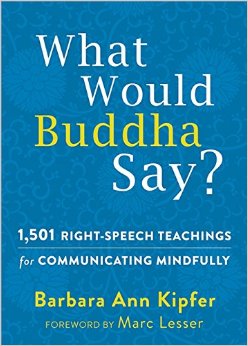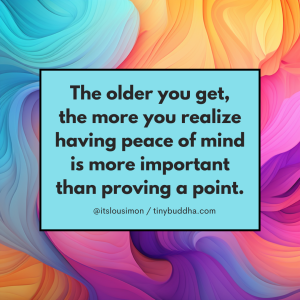
Update: The winners for this giveaway are Divya Rangi and Sand.
Growing up in a loud Italian family, I learned early on to scream and speak fast if I wanted to be heard. Neither of these things is conducive to speaking mindfully. And doing these two things together, especially when angry or agitated, all but guarantees a stressful, ineffective conversation.
I’ve had quite a few of those in my life. And more times than I care to admit I’ve hurt people with things I’ve said—to them or about them.
I’ve offended people by speaking impulsively, I’ve damaged trust by venting to a third party instead of confronting someone directly, and I’ve insulted people to get a few laughs without really considering the impact of my sarcastic words.
While I’ve made tremendous progress with these things, I know I still have room for improvement. If you do, as well, you may appreciate Barbara Ann Kipfer’s What Would Buddha Say?
The book presents 1,501 mindful communication tips based on the Buddhist concept of Right Speech—speech that is useful and beneficial—including:
It’s not just what you say—it’s how, when, and why you say it.
Even though what you have to say is important, you can respect what others find important at the time.
Listen with compassion, without judgment, and with an open mind.
It’s essentially a massive list of reminders to help you give your full, thoughtful attention to your words so you’re more likely to communicate clearly and less likely to damage your relationships.
At the back of the book, you’ll find a number of short essays that address issues related to Right Speech, including anger, criticism, and overthinking, along with several meditations.
While you could read through the book from start to finish, I like to open to a random page in the morning and read one idea to carry into the day. (I recommend using the book this way, since there’s a lot of overlap with the teachings, and they don’t build on one another, but rather complement each other.)
I’ve found that absorbing just a few words about watching my words helps me set the intention to speak mindfully, and that setting this intention is the key to kinder, clearer, more effective communication.
I’m grateful that Barbara took the time to answer my questions about her book and Right Speech, and that she’s provided two free copies of What Would Buddha Say? for Tiny Buddha readers.
 The Giveaway
The Giveaway
To enter to win one of two free copies of What Would Buddha Say?
- Leave a comment below
- For an extra entry, tweet: Enter the @tinybuddha giveaway to win a free copy of What Would Buddha Say? http://bit.ly/1giwpOP
You can enter until midnight PST on Friday, July 10th.
The Interview
1. Tell us a little bit about yourself and what inspired you to write this book?
I am an inveterate listmaker. I started my “things to be happy about” list in 1966, sixth grade. That became 14,000 things to be happy about, which has been in print for twenty-five years and has sold more than a million copies.
I’ve been a lexicographer for nearly forty years and at one point I was compiling a kids’ encyclopedia. When I got to the subject of Buddhism and started reading about it, I was overjoyed that the Buddha loved lists, too, and he taught others by using lists.
From there, I decided to learn as much as I could and earned a Master’s and PhD in Buddhist Studies. That knowledge has made it possible for me to write spiritually themed books like What Would Buddha Say?
2. How can we improve our lives and relationships by practicing Right Speech?
Here is what I think I should have put for the first entry: If you hear a human voice…listen! That person is probably talking to you! And I am not joking: the biggest improvements we can make in the area of Right Speech are to listen more and talk a lot less.
Think about how you get yourself in trouble, how you usually get into conflicts with others, how unhappiness is often caused. The majority of the time, the cause is what you say. This book is offered to help readers learn to speak truthfully and with lovingkindness.
3. What have been the biggest challenges for you personally when it comes to practicing Right Speech?
Exactly the same as everybody else—which is why I was so keen on writing this book out of the eight parts of the Noble Eightfold Path.
As a lexicographer and listmaker, I have been awash in the world of words all my life. As a Buddhist studies scholar, I read and read and read about Right Speech. Yet, I say something boneheaded just about every day! I need a book of reminders, so I wrote one.
I have worked from home for thirty years, so my social skills are not honed like others’ and I’m also sometimes starved for social contact. So when I go to something where there are people, I sometimes overshare or voice my opinions too boldly. I have been practicing mindfulness so that I stop myself before launching into one of these “Barbara thinks” soliloquies.
4. Oftentimes, we say things we don’t mean to say because we speak when we are angry. How can we work on this so we less frequently say things we regret?
Before real anger occurs, there is a mental discomfort and an awareness that something is happening that you do not want. By being mindful and aware of that momentary gap before reacting takes over, you can make a controlled, graceful response. Learning how to return to the present moment with mindfulness is like a safety net when you are provoked by anger or hatred.
5. What, have you found, is the best approach to responding when someone else speaks unkindly to us?
If someone is expressing anger or unkind words toward you, watch your breath and keep it slow and steady. Pause for several seconds and wait. The person may sense that they are being unkind or angry and they may stop. If you react with hurt or anger, then you yourself destroy your own peace of mind.
It is not that we should stand there and take it. Often, there are choices. If you do not react and the person continues a tirade, you can simply walk away. You can try to change the subject or even make a joke, but that is often not as effectual as walking away.
In the pause, remember that you, too, have acted this way toward others—maybe even the very person who is now doing it to you.
Some compassion may arise. And in the moment of compassion, you can remind yourself that the anger the other person is expressing may have little or nothing to do with you, but has formulated due to other things that person is having trouble handling.
6. What is one thing we can do to start speaking more kindly to ourselves?
The most important person to speak kindly and truthfully to is yourself, with inner speech. Negative inner talk only creates a negative inner emotional landscape. Show as much compassion to yourself as you would toward others and watch your life begin to change for the better.
Part of the reason we are unkind to ourselves is because we overthink things we have done in the past or what we will say or do in the future. Practicing the art of staying in the present moment keeps you from heading off to the past or future, where you tend to berate or prepare yourself.
Our world is full of competitiveness and comparison. We are faced with it constantly. The expectations we have for ourselves and others create unskillful thoughts, speech, and actions. By first being kind to yourself and giving yourself a break if you say or do something “wrong,” puts you on the path toward being kind to others and giving them a break.
7. How can we apply the teachings of Right Speech to our online communication to create more intentional interactions and less hurtful ones?
Whenever you are about to write or say something, ask yourself if the words will result in well-being or harm. If well-being, then say it. If harm, then do not say it.
8. One piece of advice from your book that really stuck with me was, “Resist the urge to tell others what they need.” Can you elaborate a little on this, and why it’s crucial to Right Speech?
We like to solve problems and make them go away. We have a great aversion to problems, big or small, ours or others’.
If someone complains about their job, rather than listen, we may suggest that they quit and get another job. It’s not like the other person does not know that! Why do we feel the need to make such a statement? The reason is, we want things to always be nice, no suffering and no problems.
We expend a lot of effort trying to control things, to avoid unpleasantness and grasp more pleasantness.
It is best to listen to a friend, simply listen, without feeling duty-bound to solve the person’s problems for them. Accept not understanding or being in control as a liberation and a positive choice.
9. In addition to the challenges of speaking kindly, many of us struggle with listening fully, especially since our lives—and minds—can get so busy. What’s one thing we can do to become better listeners?
Listening is an art. We need to practice it more! It is optimal to listen with a still and concentrated mind. Then it is possible to be responsive to what is being said.
The combination of a meditation practice and the practice of mindfulness in everyday life is what is needed to cultivate a still and concentrated mind. That mind is capable of the pause, the thoughtful response, the silence instead of yelling or being snippy.
If you want others to listen and understand you better, think about what makes you want to listen. A person who speaks kindly about others and the world is someone you like to listen to. A person who talks about interesting things, things of interest to more than just themselves, is someone you like to listen to.
10. What do you hope readers take away from What Would Buddha Say? and its emphasis on intentional communication?
Remember that Right Speech is a practice. The more you practice, the more you will feel the difference between reacting blindly and responding—being aware of what you do.
Practice is what makes the difference between a position held in principle and its day-to-day application. Whatever you practice, you get better at.
The more often you get irritated, the better you get at irritation. The more often you speak kindly, the more often you will default to speaking kindly. If you want to go in a different direction, you need to work at it.
You can learn more about What Would Buddha Say? on Amazon here.
FTC Disclosure: I receive complimentary books for reviews and interviews on tinybuddha.com, but I am not compensated for writing or obligated to write anything specific. I am an Amazon affiliate, meaning I earn a percentage of all books purchased through the links I provide on this site.
Buddha and sunset image via Shutterstock
About Lori Deschene
Lori Deschene is the founder of Tiny Buddha. She’s also the author of Tiny Buddha’s Gratitude Journal, Tiny Buddha's Worry Journal, and Tiny Buddha's Inner Strength Journal and co-founder of Recreate Your Life Story, an online course that helps you let go of the past and live a life you love. For daily wisdom, join the Tiny Buddha list here. You can also follow Tiny Buddha on Facebook, Twitter, and Instagram.
- Web |
- More Posts













 Though I run this site, it is not mine. It's ours. It's not about me. It's about us. Your stories and your wisdom are just as meaningful as mine.
Though I run this site, it is not mine. It's ours. It's not about me. It's about us. Your stories and your wisdom are just as meaningful as mine. 